#like yes i will sir
Explore tagged Tumblr posts
Text
its night time and im tired of studying but then i remember scoups told me to go get a diploma like yes sir o7 anything for u sir o7
#like yes i will sir#i hate my course lowk but yes i will o7#on my knees for him#papacoups always watching guys#scoups#seventeen#kpop#im actually very self aware#being delusional is just fun and they give me so much inspiration everyday and literally dragged me out of my depression hole#hehe#i love my silly kpop boys#literally the light of my life right now#also comeback soon people#stream !!! vote !!! do everything !!!#i miss scoups a lot
2 notes
·
View notes
Text
Wolverine being a confirmed boy kisser by Hugh Jackman.
#I’m a gaslighter I know. I’m trying to change my deceiving ways#I love how actors stay in mind of their characters and he’s like ‘with my boyfriend’ sir stop PLAYING MIND GAMES with me ughh#hugh jackman#he did it audience dude and HE’LL do it again#deadpool 3#deadpool and wolverine#logan howlett#wolverine#xmen#poolverine#deadclaws#Interviewers is just like me hmm hmm#Fanboy: Don't do it Wolverine!#WOLVERINE: YES
9K notes
·
View notes
Text
hi im thinking abt this bit of dialogue from the duke nukem bulletstorm dlc again. what the FUCK did he mean by this
#like pardon my french but 🤨🏳️🌈❓❓❓❓❓❓❓#edit: since the tags seem unsure abt it yes this is actual real dialogue from the game#duke nukem#retro fps#lemmie tell yall when tai showed me this for the first time i was in shock for like a good 3 hours bc PARDON SIR???
23K notes
·
View notes
Text
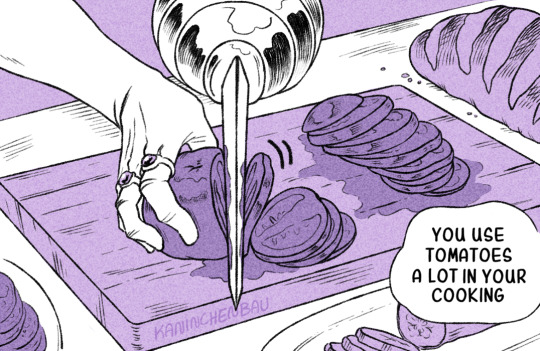
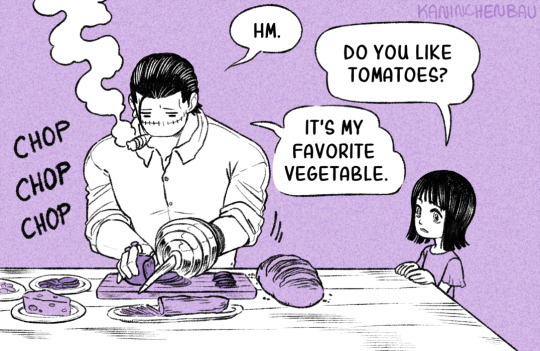
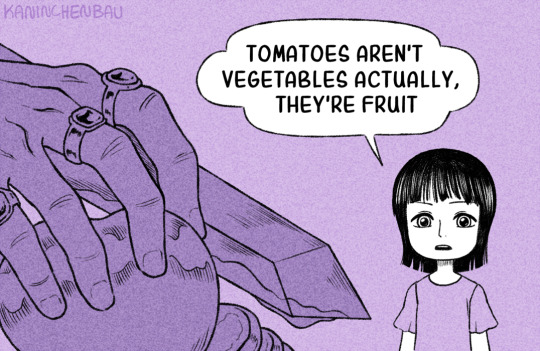
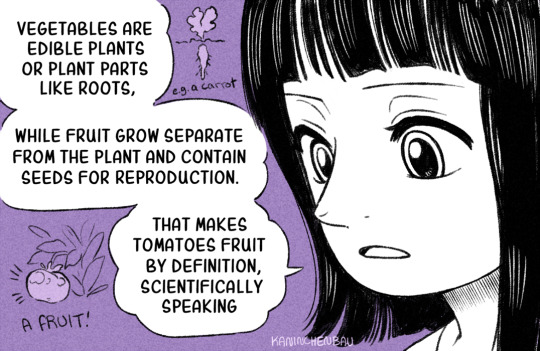
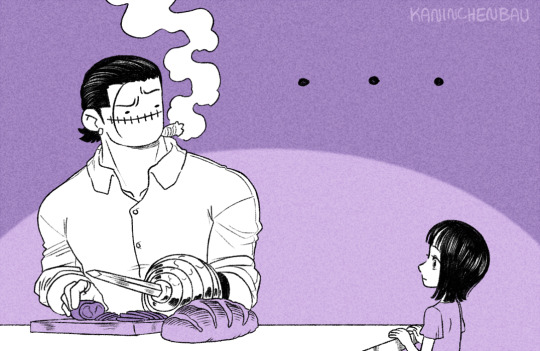
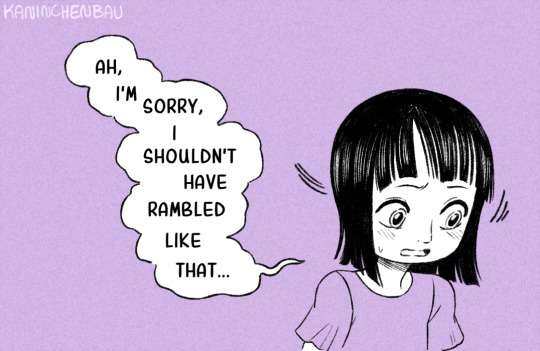
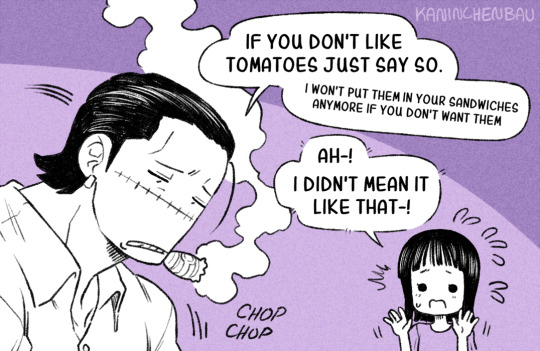
People keep on asking for more Baby Robin and Papadile so here is more Baby Robin and Papadile. Now never ask anything from me ever again
#My art#One Piece#Long post#Sir Crocodile#Nico Robin#Alternatively panel 5 would've been a close up of Crocodile's face from Robin's POV where he looks like he's giving her a death glare#Not intentionally he's just a big scary bastard with a Resting Murder Face and Robin is a small traumatized child#But I wanted to focus on the silliness of the moment so you get the goofy version instead#IDK man there's just something very funny to me about the idea of Robin just randomly info-dumping about a subject she's read about#And Crocodile being like ''?????????????????????? The fuck you talking about??''#Robin leaves the ship's kitchen and Crocodile just stares at the tomato like ''...It's a fruit? Forreal?''#(Meanwhile Robin is sweating bullets like ''I called his favorite vegetable a FRUIT right in his FACE he's going to KILL ME'')#Robin grew extra feet from the bottom of her feet to reach the counter and that actually isn't me trying to explain bad art away#In the original Papadile comic there was a panel of Robin doing the dishes with extra feet to reach the sink but I cut it out#(It was a stress relief comic I did not feel like drawing a complicated background in detail) (BUT YES I THOUGHT OF IT)#Nico Robin Age 11 is *more* than capable of cooking Crocodile just does not trust her with his food. At least not yet#She did start doing the dishes unprompted and continues to do so (mostly out of fear). Croc told her she didn't have to but allows it#IDK a lot of people seem to headcanon Crocodile as incapable of cooking and like. Surely Mr ''I don't trust people'' knows how to cook#Like he doesn't have to be a master chef or anything but and maybe he enjoys not HAVING to cook (pain in the ass with one hand + knife/hook#But surely he can cook decent enough. SURELY#Botanists don't @ me I know the ''tomato is a fruit'' thing isn't fully accurate this is just a silly little haha comic
4K notes
·
View notes
Text
the thing about art is that it was always supposed to be about us, about the human-ness of us, the impossible and beautiful reality that we (for centuries) have stood still, transfixed by music. that we can close our eyes and cry about the same book passage; the events of which aren't real and never happened. theatre in shakespeare's time was as real as it is now; we all laugh at the same cue (pursued by bear), separated hundreds of years apart.
three years ago my housemates were jamming outdoors, just messing around with their instruments, mostly just making noise. our neighbors - shy, cautious, a little sheepish - sat down and started playing. i don't really know how it happened; i was somehow in charge of dancing, barefoot and laughing - but i looked up, and our yard was full of people. kids stacked on the shoulders of parents. old couples holding hands. someone had brought sidewalk chalk; our front walk became a riot of color. someone ran in with a flute and played the most astounding solo i've ever heard in my life, upright and wiggling, skipping as she did so. she only paused because the violin player was kicking his heels up and she was laughing too hard to continue.
two weeks ago my friend and i met in the basement of her apartment complex so she could work out a piece of choreography. we have a language barrier - i'm not as good at ASL as i'd like to be (i'm still learning!) so we communicate mostly through the notes app and this strange secret language of dancers - we have the same movement vocabulary. the two of us cracking jokes at each other, giggling. there were kids in the basement too, who had been playing soccer until we took up the far corner of the room. one by one they made their slow way over like feral cats - they laid down, belly-flat against the floor, just watching. my friend and i were not in tutus - we were in slouchy shirts and leggings and socks. nothing fancy. but when i asked the kids would you like to dance too? they were immediately on their feet and spinning. i love when people dance with abandon, the wild and leggy fervor of childhood. i think it is gorgeous.
their adults showed up eventually, and a few of them said hey, let's not bother the nice ladies. but they weren't bothering us, they were just having fun - so. a few of the adults started dancing awkwardly along, and then most of the adults. someone brought down a better sound system. someone opened a watermelon and started handing out slices. it was 8 PM on a tuesday and nothing about that day was particularly special; we might as well party.
one time i hosted a free "paint along party" and about 20 adults worked quietly while i taught them how to paint nessie. one time i taught community dance classes and so many people showed up we had to move the whole thing outside. we used chairs and coatracks to balance. one time i showed up to a random band playing in a random location, and the whole thing got packed so quickly we had to open every door and window in the place.
i don't think i can tell you how much people want to be making art and engaging with art. they want to, desperately. so many people would be stunning artists, but they are lied to and told from a very young age that art only matters if it is planned, purposeful, beautiful. that if you have an idea, you need to be able to express it perfectly. this is not true. you don't get only 1 chance to communicate. you can spend a lifetime trying to display exactly 1 thing you can never quite language. you can just express the "!!??!!!"-ing-ness of being alive; that is something none of us really have a full grasp on creating. and even when we can't make what we want - god, it feels fucking good to try. and even just enjoying other artists - art inherently rewards the act of participating.
i wasn't raised wealthy. whenever i make a post about art, someone inevitably says something along the lines of well some of us aren't that lucky. i am not lucky; i am dedicated. i have a chronic condition, my hands are constantly in pain. i am not neurotypical, nor was i raised safe. i worked 5-7 jobs while some of these memories happened. i chose art because it mattered to me more than anything on this fucking planet - i would work 80 hours a week just so i could afford to write in 3 of them.
and i am still telling you - if you are called to make art, you are called to the part of you that is human. you do not have to be good at it. you do not have to have enormous amounts of privilege. you can just... give yourself permission. you can just say i'm going to make something now and then - go out and make it. raquel it won't be good though that is okay, i don't make good things every time either. besides. who decides what good even is?
you weren't called to make something because you wanted it to be good, you were called to make something because it is a basic instinct. you were taught to judge its worth and over-value perfection. you are doing something impossible. a god's ability: from nothing springs creation.
a few months ago i found a piece of sidewalk chalk and started drawing. within an hour i had somehow collected a small classroom of young children. their adults often brought their own chalk. i looked up and about fifteen families had joined me from around the block. we drew scrangly unicorns and messed up flowers and one girl asked me to draw charizard. i am not good at drawing. i basically drew an orb with wings. you would have thought i drew her the mona lisa. she dragged her mother over and pointed and said look! look what she drew for me and, in the moment, i admit i flinched (sorry, i don't -). but the mother just grinned at me. he's beautiful. and then she sat down and started drawing.
someone took a picture of it. it was in the local newspaper. the summary underneath said joyful and spontaneous artwork from local artists springs up in public gallery. in the picture, a little girl covered in chalk dust has her head thrown back, delighted. laughing.
#writeblr#warm up#this is longer than i wanted i really considered removing that part about myself and what i went thru#but i think it really fucking bothers me that EVERY time i talk about being an artist#ppl assume i just like. had the skill and ability to drop everything and pay for grad school.#like sir i grew up poor. my house wasn't a safe space. i gave up a FREE RIDE TO LAW SCHOOL. for THIS. bc i chose it.#was it fucking hard? was i choosing the hard thing?? yes.#but we need to stop seeing artists as lazy layabouts that can ''afford'' to just ''sit around and create''#when MANY - if not MOST - of us are NOT like that. we have to work our fucking ASSES off. hard work. long and hard work#part of valuing artists is recognizing the amount we sacrifice to make our art. bc it doesn't just#like HAPPEN to us. also btw it rarely has anything to do with true talent.#speaking as someone with a chronic condition i hate when ppl are like u have it easy. like actively as i'm writing this my hands r#ACTIVELY hurting me. i haven't been posting bc my left hand was curled in a claw for the last week#this isn't fucking luck. after a certain point it's not even TALENT. it's dedication & sacrifice.#''u get to flounce around and do nothing with ur life'' is a narrative that is a direct result of capitalism#imagine if we said that about literally any other profession.#''oh so u give up 10 yrs of ur life to be a doctor? u sacrifice having a social life and u get SUPER in debt?#u need to work countless hours and it will often be thankless? well i wish i was that lucky''#we should be applying that logic to landlords ONLY#''oh ur mom and dad gave u the money to buy a house? and all u did was paint it white and rent it? huh.''
11K notes
·
View notes
Text
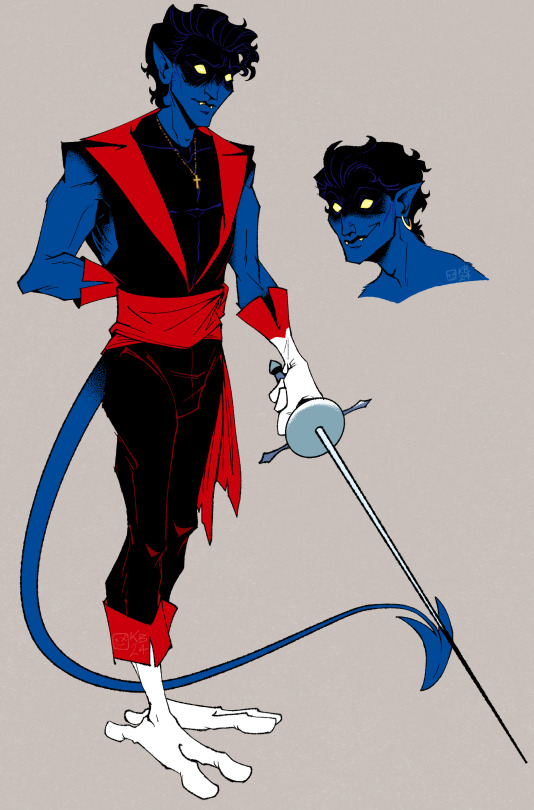
I've been getting into X-Men lately! Or, well. One specific X-Man.
#nightcrawler#kurt wagner#xmen#x men comics#x men#kettlebird art#fanart#comic fanart#marvel#marvel comics#marvel fanart#mutant#bamf#listen I like the rest of the team a lot#genuinely its such a fascinating dynamic for a marvel comic team#and the concept is far more interesting to me than anything else they've put out#but c'mon#I'm not immune to fuzzy elf#the moment he showed up there was no way I could stay impartial he was in an instant fave#Also yes this is my own outfit design#I tried not to stray too far from his classic outfit but I think he should be a little more swashbucklery#and a whole lot sluttier. Sir get those arms out where I can see them
3K notes
·
View notes
Text















The smirk <3 (part 1)
#are you an anime villain sir#sir do you think this is an anime#yes there's a part two#he smirks a lot#making these gifs made me realize he has a cleft earlobe!#it looks like an upside down heart <3 (i am nuts this took me so long)#interview with the vampire#iwtv#iwtv spoilers#interview with the vampire spoilers#armand#armand iwtv#mine#gif#gifset#iwtv s2#interview with the vampire season 2
1K notes
·
View notes
Text

Unpopular opinion but Wouldn’t You Like is really good and people should pay more attention to it
#epic the musical#epic the underworld saga#epic the troy saga#epic the circe saga#hermes#odysseus#this song has me in a chokehold#Hermes is a dick I love him#wouldn’t you like a taste of the power#like yes sir I do#the horse and the infant#monster#wouldn’t you like#don’t get me wrong#I still love the other ones#but goddam I love wouldn’t
2K notes
·
View notes
Text
i love when people suddenly ask my pronouns like some light just turned on in their head and they went "holy shit it's a faggot!"
#like what is the goal of asking this question??#what makes this important enough to interrupt the conversation#am i supposed to be like 'why yes sir i am a fag' lmao
857 notes
·
View notes
Text
Transcript:
You flew the mother plane directly into the world serve center.
Hit the cuntagon!
Audio source

#gabriel ultrakill#ultrakill#the way he said 'hit the cuntagon' like a command ����#yes sir i'll get to it right away. what position u like- sorry. i didnt say that last part.#i went to drone flight school and all i got is this stupid black box and the only thing on it is this audio#I didn’t have the time to make an ultrakill version of that pic </3
613 notes
·
View notes
Text
Ideology of Exceptionalism and Gravity Falls; meta and character analysis

I had a whole ago read a post by @icanlife that had a quote by Alex Hirsch on Ford's greatest flaw, and wanted to explore what the flaw is, which is the ideology of exceptionalism; in the exploration, I’ll touch on what it is and how it is used in abusive relationships and cults, as well as how it drives multiple Gravity Falls characters and consequently how it impacts relationships between these characters, and how the show ultimately refutes exceptionalism.
Quick note here; I am not in any way, shape or form a psychologist nor have any formal training in psychology; this is written from my own experiences with this ideology and my own forays into psychology and trauma-informed learning. It is also written with a loose understanding that is likely not broad enough to cover all references to cults, extremist groups and abusive relationships.
The Ideology of Exceptionalism
First of all, we have to get through a drier bit, which is… what is the ideology of exceptionalism and how does it arise? Might be fairly obvious, but it is the belief that you are, or belong to, a group of exceptional people, thus more important and worth more than anyone else; ie, those who don't qualify as 'exceptional'. It is often a subconsciously learned ideology. Now, what qualifies one as exceptional can be extremely varied; generally it revolves around something that provides some form of privilege. Thus, it might be, as the main exceptionalist idea in Gravity Falls, 'intelligence', or power, or it can be such things as attractiveness, quantity of money one has, species, nationality, or skin colour and ancestral heritage. The ideology of exceptionalism, being by nature hierarchical, devalues, and at its worst, openly and violently dehumanizes those who do not qualify as exceptional.
For why exceptionalism occurs is an extremely broad topic, but I've personally found that, for exceptionalism revolving around intelligence, it's a result of a poor sense of self-worth, and having one's self-worth tied to what makes one exceptional. Poor self-worth itself (again, broadly) is a result of childhood trauma from a lack of positive affirmation and unfulfillment of the emotional needs of the child. Meanwhile, self-worth becoming tied to the quality of exceptionalism generally is a result of when positive affirmation was pretty much solely provided around their 'exceptionalism', especially when provided derogatory commentary, or a blatant example of how they would be treated if they aren't 'exceptional'. As a result of the general lack of affirmation, self-worth then becomes often solely reliant on the qualities of exceptionalism, as that is the only way for the child (and later, adult) to get affirmation of their worth, as well as out of fear of being ‘not worth anything’ like the examples of ‘non-exceptional’ people they have been given.
This is especially likely to occur when the child is a social outcast; the adoption of the hierarchical ideology of exceptionalism, and the devaluation/dehumanization of others often occurs subconsciously as an avoidance/minimization tactic from pain. This is to say, the child, and later the adult (if healthy self-worth is not established) goes 'it doesn't matter what the non-exceptional people say or if they accept me since I matter more than them because of my exceptionality'. It can even be taken further, that being shunned is part of one's exceptionalism, and becomes part of the qualifier of being exceptional. For instance, 'they just can't understand because they aren't exceptional and that's just a part of being exceptional'. This idea also neatly tailors into the part of the concept of being better then others means you are separate from others; this can be taken that someone who is special, needs to be alone to be truly special.
Obviously, exceptionalism is not a healthy coping mechanism for poor self-worth, as often such people constantly feel the need to prove and show off their exceptionalism to gain that affirmation and avoid rejection, which is stressful. As well, it often negatively impacts their relationships with other people as a result of the arrogance of believing that they are better than most others, or even deliberate sabotage due to their arrogance. This occurs as they flatten the complexity of human experience to black-and-white hierarchical categories of exceptional/not-exceptional through constant judgement of those they meet, and often refuse to engage with people who don't belong to their 'exceptionality', or even people they simply don't like, even if they technically qualify. Generally, those that they do like or have close relationships with, often due to being similar, are automatically labelled as 'exceptional'. Those judged as ‘exceptional’ also become privy to the open judgements of ‘non-exceptional’ others, out of a subconscious belief by the exceptionalist that the other believes similarly; something that may strain their relationship if the other doesn’t ascribe to exceptionalism. This all culminates in the exceptionalist being blind or even adverse to the diversity of experiences, which makes it difficult to create relationships and community outside of echo chambers of their own beliefs (if they can even find this), and subsequently, these people are often isolated and have very few to no close relationships with people.
However, all humans require connections with other people, relationships where one can rely on others emotionally and physically if needed and feel accepted; they also require to feel like they are worth something, that their life has meaning. Lacking meaningful connections and having a crippled sense of self-worth, a deep yearning hole is left in these people. Exceptionalism, especially as it is a narrative constantly pushed by Western society as it validates hierarchies, is then employed as a (often subconscious) trauma response to assuage this yearning hole, with arrogance and denial. And depending on the circumstances, it can be a very strong and definitive trauma response for people.
This isolation and lack of self-worth is catnip to abusive relationships, including cults and extremist groups. These types of relationships often heavily rely on isolating their victims or pulling them into echo chambers of solely the abuser’s rhetoric, to redefine what is healthy through gaslighting; as the exceptionalists are already isolated, this makes them extremely susceptible. They also often provide these people affirmation, and in these cases especially about their exceptionalism, thus confirming their self-worth, their 'specialness', while also providing them the connection they have been lacking, either through the cult community or through the abuser’s own presence. These emotional needs, which haven’t been met in a long time, if ever, begin to be fulfilled; something that abusive relationships and cults hinge on, rather than any form of logic.
Ideology of Exceptionalism and Gravity Falls
The main characters within Gravity Falls which are heavily ascribed to exceptionalism would be both Ford and Bill; this characterization deeply impacts the story and their relationships with others (technically the Northwest are another case regarding wealth, but less directly impact the storyline and thus tangential; Gideon also is an example, but as a mirror of Bill). With each of these characters I’ll go into detail within their sections on the way they began to ascribe to exceptionalism, and how it plays out later in their relationships; I will first begin with Ford, then move to Bill. Then, to cap it off, I’ll go into the characterization of Stan and the way Gravity Falls refutes exceptionalism.
Ford and Exceptionalism
Firstly, the quote from Alex Hirsch that kicked this whole baby off, as mentioned previously;
“Ford sees Dipper as someone who’s special like himself. That’s Ford’s great flaw, his arrogance is he believes that there’s special people, and everyone else. That human attachments are actually weaknesses. And the song and dance that he’s giving Dipper right now, is the song and dance that he gave McGucket, back when they were younger… ‘You and me are different, we’re better than everyone else. We have a path that no one else can understand, and only us can do this.’ It’s a very seductive idea for Dipper… Dipper is a smart kid, but Ford’s projecting. Ford loves Dipper because he sees someone who’ll tell him ‘yes’ to everything. Who’ll never challenge him, who’ll do a really insane dangerous mission.”
Very blatantly Alex Hirsch calls Ford out on his arrogance in the belief that he is special, in his belief in the 'lone hero' complex, in his belief in exceptionalism. And really, it should be no surprise that Ford does so, considering the way he's depicted as a social outcast as a child (other than Stan), and the way his parents have been clearly shown to be not particularly emotionally supportive (“I’m not impressed”); they don't provide positive affirmation except for his intelligence (mostly due to the possibility of money making through it…), while also actively comparing him to Stan who is derogatorily ‘not-exceptional’, and ‘worth less’. This all sets Ford’s self-worth up to be fragile, and other than Stan who wholeheartedly accepts him, he is isolated and invalidated; plus, the only other validation he receives is around his intelligence. All very classically fitting the profile for exceptionalism.

Image id: Stand and Ford when they were children, both clearly enjoying each other's company.
Ford’s belief in his exceptionalism catalyzes after the shattering of his and Stan’s relationship. Previously the twins are shown to do everything together, having a very close caring relationship; something unlikely if Ford thought he was better than Stan. Also, when Ford is talked to about his opportunities, Ford looks uncomfortable at the way they talk about Stan as inferior, compared to how he himself is being praised; but in the offer he’s simultaneously finally being validated, he’s being told he’s someone worth something, and he’s going to be someone worth something after this. And then the science fair incident occurs, and Ford loses that validation from his parents, from the judges and a future of more validation; after being promised validation and acceptance, it slips through his fingers. And in his anger of being denied that, it becomes easy to begin to slip subconsciously into the rhetoric the others have been feeding him; that he’s exceptional, that Stan isn’t, and he deserved to be recognized for his worth. So he breaks the relationship with the only person who accepted and validated him for who he is. With that loss of previous support, Ford becomes then deeply obsessed with proving his exceptionalism to the world to assuage that fragile self-worth, to become accepted, or even better, revered, confirming that he is someone of worth, someone special, like he was promised.
Ford’s obsession also doubly functions as a way to alleviate his guilt over shattering their relationship; if he’s exceptional as he believes, then he’s within the right to respond the way he did, as he’s worth more than Stan, he's better off alone, and he has a right to be angry over being denied that validation. As well, in much the same way as it is used as a way to alleviate his guilt over the end of their relationship, it is also likely used in a way to minimize the pain of being ostracized (although not directly depicted); afterall, Ford’s keenly aware and insecure about his social ineptitude and his six fingers as things that make him different from other people, case in point with his experience visiting Lazy Susans Diner. Thus it wouldn’t be unsurprising if he uses the idea of being worth more than those who ostracize him to imply it ‘doesn’t matter’ what they think. His ostracization by nature keeps him from generally forming close relationships, with the exception of Fiddleford (who much like him, is socially outcast, and intelligent) during his university days. As a result, he's isolated and acutely lonely, having lost Stan.

Image id: One of the missing Journal 3 pages in TBOB, detailing Ford's botched social interaction in Lazy Susans Diner. In the background is the print of his six-fingered hand.
In his obsession over being acknowledged, Ford, like many others who believe in exceptionalism, identifies strongly with the causes of his ostracization (his intelligence, his six-fingeredness) as part of, or wholly, makes him exceptional. It is obvious through his choice of study; with the grant he has been gifted, he chooses to revolve his work around the weird, the outcast, something that you see Ford gravitate towards being an outcast and deemed 'weird' himself (which in Journal 3 he openly talks about). Something that can be, much like him, framed as 'exceptional'. His work is even recorded in a journal that Ford deliberately chooses to put his six-fingered hand on the cover of. Intertwined with the way it becomes adopted into the idea of exceptionalism, is the keen loneliness from his ostracization and a deep desire to be accepted and a wish to find a community of other weird people.

Image id: Two pages from journal 3, labelled 'Myself', in which Ford is open about being weird, and a social outcast, while also noting his ambitions and that 'Gravity Falls, [is] the place that I fit in.'
Ford and Bill
All of this culminates in Ford becoming an incredibly easy target to manipulate by Bill. He’s desperate to be acknowledged (and thus accepted) by an authority figure so that his belief in exceptionalism is justified and his self-worth confirmed. And he knows he’s intelligent, that he's exceptional because people have told him so, but he just needs to prove it with something that shakes the world. And the grant is finally his second chance after the fair, but he's stuck, and the research is going nowhere, and he's in a town where he doesn't really know anyone and he’s so terribly lonely. And sure, he clings to his exceptionalism but if he can't even prove it then is he really exceptional? Is he even worth anything like he thought he was? And what about what he's left behind, rejected, because of his exceptionalism?
And THEN he finds an incantation and he ignores the warnings because maybe, just maybe, this will be his break to get that acceptance/validation he has been chasing his whole life?
And then it's better than that.
A god, essentially, shows himself to him, an ultimate figure of authority. And he tells him that yes, he is special, he’s worth more than other people, and Bill’s only showing himself to Ford because he is so much more intelligent than anyone else. Ford is suddenly getting his exceptionalism confirmed by a god of ancient knowledge, an immensely intelligent interdimensional being, and he’s also showering him with affirmations, specifically affirmations around what Ford's fragile self-worth is based on. And even better, he's delighted by Ford's six-fingeredness; he's not put off at all, it even becomes his main nickname for Ford, just like it used to be for Stan all those years ago. On top of it all, Ford's own social ineptitude doesn't phase Bill, another thing Ford is self-conscious about; Bill's own social ineptitude as he's not human probably makes Ford feel comfortable, knowing that's not expected from him.
Through Bill, not only does Ford find someone who validates his self-worth through intelligence and even confirms to him that his weirdness is part and parcel of making him special, he also finds someone who he regularly (generally) is in contact with, who enjoys talking to him and even banters with him familiarly. Hell, Bill even deliberately goes out of his way (literally possessing a whole wack ton of rats, then dream karaoke) to celebrate his birthday with him; how long do you think Ford has simply skipped his birthday since he had no one to really celebrate it with? The loneliness, beneath his arrogance and belief in exceptionalism, is being fulfilled; for the first time since Ford was a teenager, he's fully accepted by someone, social awkwardness, six fingers, exceptionalism and all.

Image id: One of the lost pages from Journal 3 in TBOB, the 'one thing led to another' page, with Bill and Ford singing karaoke and drinking together, both clearly enjoying themselves; Bill has an arm slung around Ford's shoulders.
So it's really no surprise at all that Ford fell for this, hook line and sinker. Hell, if I was in Ford's shoes I would fall for it just as hard. And I've seen a few posts floating around talking about how Bill is bad at manipulating, and no, he's not. He was able to pinpoint exactly what Ford wanted and needed, and provided that, was charismatic enough to provide that. Again, manipulation isn't about logic. It really isn't; it's about the emotional core in people, what people lack and what you can give them to slowly reel them in to sing your dance and song. And people will ignore vast swaths of red flags when you're finally being accepted, when you're finally getting your emotional needs met at least in some way or form. It's better than not having them met at all, such as previously. So Ford worshipping Bill is really not a surprise, especially as Bill deliberately stoked it.
All of this is part of why you see Alex Hirsch call Ford's belief in his exceptionalism his greatest flaw; because it allowed him to be very easily manipulated by Bill, and by its nature kept Ford isolated from others, evident by his arrogance in assuming he knows best and refusing to see other people who aren't as 'intelligent/weird' as him as worth getting to know, listen too and even reach out to ask help from, it's him believing he has to be the lone hero as someone whose 'special'. It's something that blinds him to the danger of his work around the weirdness of gravity falls because he’s desperate to seek a place where he and his weirdness belong, and it's something that plays out in each and every relationship he has because it's something he clings to so deeply. It's what cost him his relationship with Stan, who previously accepted him completely, and, as he's disinclined to form new relationships and as Bill actively strokes his paranoia (Trust No One…), ultimately further increases the hold Bill has over him. It's only Fiddleford’s presence as he works with Ford that allows him some form of outside reference and reprieve from solely Bill’s influence, something that Bill resents deeply and is clearly jealous and angry about, even if Fiddleford is helping create the portal. And it's ultimately Fiddleford, once he was aware enough of what was happening, calls Ford out on it, seriously jeopardizing Bill's influence over Ford; but Ford is too invested in the portal, in chasing his own ambition and caught up in Bill’s manipulation to take him seriously, until the incident with the trial, and Ford beginning to hear other voices then Bill.
Ford’s Exceptionalism and Wider Relationships
Now back to how it plays out in all Ford's relationships; we've already gone over it with Bill's influence, because it made him extremely easy to manipulate, and with his disregard of Stan in favor of validation of his exceptionalism. But Ford, as pointed out by Alex Hirsch, also exerts the ideology's seductive rhetoric to both Fiddleford and Dipper (who look up to Ford) in a similar way that Bill does with him (although there is a difference of it being used intentionally and maliciously, compared to subconsciously and earnestly, even if it is problematic). Ford, with his black-and-white view of exceptionalism, sees both Fiddleford and Dipper as people who are like him; 'exceptional', and so he treats them as such, and uses this rhetoric to coerce them into helping him.
For Fiddleford, the lure is how he can change the world, how he can be finally acknowledged if he helps Ford with the portal. And it works well; he willingly chooses to leave his own work and his wife and young son, to work with Ford. Much like Ford, Fiddleford himself is also a social outcast and regularly presumed less smart than he is, and he’s got a chip on his shoulder to prove himself, to gain acknowledgement and recognition from the world at large. Although Fiddleford has a family which presumes he’s not entirely lonely like Ford is, he also clearly has deep feelings for Ford, some which are hinted to be more than just ‘friendly’ feelings; it is likely the combination of the lure of validation and spending time with Ford, a kindred spirit that accepts him and an old friend/crush, that causes him to agree (afterall, it was Ford who made Fiddleford feel accepted and choose to stay at Backupsmore). And Fiddleford’s not even considered a partner, but rather an assistant to Ford due to Ford's arrogance, and he still drops everything to go! It’s more about their relationship and connection rather than validation, but that doesn’t stop Ford from espousing exceptionalism. And this is a distinguishing difference, because although Fiddleford would like recognition, he’s not there solely because of it; he’s not a believer in exceptionalism nor arrogant about his skills, and so, unlike Ford who is blinded by his obsession, he’s much more aware of the dangers of the weirdness of Gravity Falls. Thus, he's actively calculating the risks involved, and when he realizes there could be potentially devastating consequences of the portal, he attempts to talk Ford out of it; this fails due to Ford’s own denial and obsession over the portal. In the end, it all goes terribly sideways, and Fiddleford ends up losing everything he had; his wife, his son, his friend, his memories and himself to the trauma he had experienced at the invitation of his friend with the lure of validation and company, due to the memory gun he had created himself.
As for Dipper, much like Ford, he also has issues with self-worth (many of the episodes deal with Dipper finding self-worth; ie, the manotaur episode), has a physical oddity (his birthmark) and by far the trait he relies on most for worth is his intelligence (for example, in one episode he rubs it into Mabel's face over and over again in beating her in games). He's also extremely desperate to be recognized by authority figures as someone intelligent, case in point when he summons the dead after being made fun of by the government agents to try and show them that the information he's gathered is important after Stan dismisses his knowledge. This desperation to be seen as someone of worth from Dipper, much like Ford, extends to the need to be a hero, something he even says at the end of the zombie episode; yet, due to Mabel, unlike Ford he's not a lone hero, and Mabel also half the time acts as the hero.

Image id: Zombies crawling out of a crack after Dipper summons them; Dipper and the two agents look on in horror.
It all culminates in Dipper hero-worshipping Ford when he returns; really, no different than Ford worshipping Bill. And Ford clearly finds it extremely flattering; Dipper's attention and amazement of him feeds his exceptionalism. Exactly how Ford responded to Bill, Dipper is willing to do anything for Ford, excited too, in an attempt to impress Ford and be validated and accepted. And for Ford, that's an extremely heady feeling, especially as someone who has been constantly alone the last 30 years, especially when he had one previously confirm his exceptionalism all those years ago and stopped, and now someone is once again affirming that idea. And Ford doesn't have to be alone again, because he's found a kindred spirit in Dipper as his assistant, someone ‘just’ like him, someone who is exceptional. Because he sees himself in Dipper, he begins to espouse exceptionalism unconsciously, by praising Dipper's own intellect and adventurous spirit, assuaging his feeling of self-worth, while also telling him he's more important or better than others because of it.
And it's seductive to Dipper, because he wants to hear those affirmations of his self-worth, especially as he hero-worships him, but Dipper isn't sold on it, because it means leaving Mabel behind, it means believing that he's worth more than Mabel (and also, Stan, and all his friends he’s made in Gravity Falls). It's ultimately because of his relationship with Mabel that he rejects the ideology; he's not isolated the way Ford was with Bill, and he's not willing to break that relationship for that acknowledgement, because his relationships matter more to him.
Bill and Exceptionalism
Now of course, that's only on the Pines; what about Bill?
While it's obvious that Bill uses exceptionalism as a main manipulative tactic, it's not just an ideology he sprouts emptily; it's also an ideology he believes in, just like Ford, although it's less based on intellectual exceptionalism, and more on power and 'weirdness'.
This most distinctly can be seen in Bill's denial about what happened to his home dimension; Bill's belief in his exceptionalism occurs as a pain avoidance tactic from killing his whole dimension. Bill was clearly a social outcast within his dimension due to being able to see 3d; he's not accepted, and not trusted, to the point that there is medical intervention to make him blind. That's a deeply traumatic experience that completely erases one sense of self-worth, where one’s sanity is called into question by your parents on something that is not harmful, that's beautiful and you just want to share with them. It's a deep and clear rejection of who Bill is, and his ability. As a result, out of a desperate bid to be understood and accepted, he ends up trying to show them the stars. And it ends up killing everyone.

Image id: Page of TBOB, on 'The Early Years' which notes that Bill was an oddity for seeing 3d, something that was illegal to speak about. Bill frames it as something that made him 'special' and better than all the others.
Traumatized, and originally rejected by the dimension, he instead weaves an excuse of exceptionalism; that it doesn't matter what he did to them because he's exceptional and he's worth more than all of them because he can see 3d, because he's powerful, so he shouldn't/'doesn't' feel any remorse about it. With such a traumatic result of trying to be accepted by people, he rejects the idea of trying to be accepted for who he really is; instead adopting a facade of a monster that he believes he is (and eventually, becomes).
Even if he clings to the delusion of exceptionalism, and shuns attempts to find true acceptance, he still wants it; and that's where his henchmaniacs fit in, as they're all, as Bill's noted when trying desperately to get Ford to join him, weird; each has something 'wrong' with them, which is why Bill accepted them as his lackeys (although it's not like we know the context around these). It's a surface-level acceptance however, one more predicated on fear than emotional acceptance. He's taken his 'weirdness', much like many do who believe in exceptionalism,as ‘part of what makes him exceptional'.
In the same way that Ford wants to show the world that he's smart and intelligent by building the portal, Bill does so by wreaking havoc and taking over existences as a way to show the world that he's powerful, that he's someone to be reckoned with, that he's not someone to be ignored because he's someone who's worth more than others. If you can't be loved and accepted, then being hated and feared is better than being ignored; acknowledgement at least approaches acceptance, it's validation of some sort of worth. It also functions as deliberate self-sabotage of his morals, by proving that he is the monster that killed his entire dimension; if that's what he is, then that's who he's going to be, because if he wasn’t, then he has to come face to face with his remorse over what he did to his dimension and his whole house of cards around his exceptionalism and not caring collapses. So instead he keeps feeding the delusions the denial, and lies and lies and lies and keeps lying to ignore all of it, to wrap himself in this shroud of exceptionalism and brutality as a way to function. And it somewhat works, because he's mostly deluded himself about it all, even if subconsciously he knows.
And of course, this display of Bill's exceptionalism is what brings Bill to earth, to Gravity Falls, and to manipulating humans. In meddling with earth and humanity, beyond Bill's goal of taking over earth and fleeing his own unravelling dimension, he also enjoys reaping the benefits of being worshiped by humans, who find him awe-inspiring. Their amazement of who he is, and Bill's own posturing and manipulation of people leads to Bill literally forming cults (ie ciphertology) or having apprentices that worship/find him (to varying degree) inspiring; all reinforcing his feelings of exceptionalism.
Of course, Ford numbers among these people; he praises Bill and worships him, as he's played like a fiddle by Bill, because his self-worth and belief in exceptionalism is fucked up in a way that perfectly resonates with Bill’s. Because it's the exact same types of issues around self-worth, around being an outcast, being weird and wrong physically, and yet at the same time gifted. And Ford clearly is incredibly lonely and yearning for acceptance, but so is Bill; since the beginning he's been trying to find someone who would accept him, even if he's given up on it. And for his song and dance to entice Ford in, he pretends he's not crushed dimensions for fun, that he's not a 'monster'; a version of him he buried after he had tried to show his parents the stars, one that he occasionally resurrects and puppets around for manipulation (all lies are better when they have a grain of truth). And this version of him is worshipped, but above all is accepted, is loved by Ford. The softer parts of Bill, even if they are still weird as fuck, the parts that were never far beneath the surface for all his deluding, become loved by Ford. Much as Ford becomes hooked on Bill’s praise, Bill also becomes hooked on Ford's genuine love and care. It becomes personal, unlike any previous ‘inspirations’ and Bill over time gets to the point that he feels accepted, safe enough with Ford to share about his dimension much more close to the truth then he did with any of his henchmaniacs. He becomes vulnerable with Ford, in response to Ford’s own vulnerability with him. He’s finding acceptance for the first time in his life around the softer parts of himself, not just the feared acknowledgement that comes from his dimensions conquering; much like Ford is finally finding companionship and acceptance with Bill, not just only intellectual validation. Bill's also for once, not just self-serving; he cares, and goes out of his way to take time with Ford, even celebrating Ford's birthday (in the unique way he does things), both with the rats and the karaoke.

Image id: One of the lost Journal 3 pages in TBOB. Ford recounts Bill talking about the destruction of his dimension, and calls himself by implication a monster.
They're both fulfilling each other's emotional needs, needs which both of them have struggled with most, if not all of their lives (although their relationship is certainly not healthy, considering it's codependent as fuck, riddled with exceptionalism and oodles of power imbalance issues). And suddenly, against Bill's plans, Ford's no longer just a disposable pawn, but someone Bill wants as part of his team, someone by his side, closer than his henchmaniacs are. He's unwittingly fallen for Ford, and so when everything goes sideways in his plan, and Ford swears it off, suddenly cutting off their relationship and that acceptance Bill had finally felt, he spirals into grief and anger from the rejection. As a result, he becomes extremely abusive to Ford in desperate attempts to continue their relationship, and ultimately he becomes obsessive over Ford joining him again as Ford continues to refuse, as evidenced by both Weirdmageddon and the Book of Bill.
Stanley Pines, and the Refuting of Exceptionalism
Exceptionalism, being a negative driving factor behind many core character dynamics, is ultimately refuted by the show. This occurs multiple times over the show, such as with Mabel in the Pioneer Day episode, especially compared to Pacifica, but mostly through Stan's characterization. Stan is someone who has been since the beginning characterized (if lovingly so) as someone who is a failure by societal standards; he’s an older man running a run-down tacky tourist shop to swindle gullible tourists out of their money, has multiple divorces, has an ongoing feud with a literal 12 year old, clearly has had multiple mishaps with the law (some ongoing), is generally pretty self-serving and is extremely lonely and really had no close relationships until Mabel and Dipper showed up. He's not exceptional; he's not even what we would consider 'decent' enough to have a 'typical, hard working job’. In short, he’s a failure, a stark difference to the idea of 'exceptionalism' that characterizes Ford. If he's gifted in any area, it would be charisma (debatedly), not anything else.
But it's still Stan who rebuilds the portal from literally only one journal (not all three!) and gets it to work. It even seems like he only needs some codes from the other two journals when he does get them, suggesting that he was able to extrapolate from what was left and the first journal’s blueprints to fix it entirely, something that is extremely difficult and technically complicated (Ford, Bill and Fiddleford all worked on it together!). Stan's able to do it, even if it's been shown he's not 'naturally' gifted in that area. And it's something he does as a result of his deep care for Ford; because even after their fights, he cares about Ford and wants to right his wrongs, believes he should, because of his whole life of being defined as a failure and even worse than that, screwing up his ‘exceptional’ brother’s life. And he’ll do it even if that means learning how to build an interdimensional portal, even if it takes up thirty years of his life doing so, and he doesn't waver. Much of this is connected to his own complexes around being deemed a failure compared to Ford, having failed to succeed in his life, and how he feels that he needs to atone for screwing up Ford’s life, now for the second time; but beneath it all, he also cares. Much like Ford, he's extremely lonely, but he's not blinded by Ford's arrogance, and as a result he wants to make sure Ford's safe, because that's what he used to do, they’re twins, they grew up together, they once they had fully accepted and cared for each other, and dammit that still means something, and Stan hasn't found that depth of emotional connection since. So if possible, he wants to rekindle that closeness they had, but first, he needs to bring Ford back.
And in the end, it's not Ford's own special gun he built using his intelligence that 'kills' Bill. It's Stan, someone who Ford had long ago broke it off with in search of validation of his exceptionalism, someone who both Ford and Bill labelled as 'not-exceptional', who defeats Bill. It's exceptionalism's devaluation of people who are 'not-exceptional' that causes Bill to underestimate the Pines beyond Ford, and it's only when Ford put aside his exceptionalism and his refusal to accept and trust 'non-exceptional' people, that is, trust Stan once more, that causes Bill to end up defeated by Stan.
In the end, it's not about who's 'smarter'; it's a reminder that everyone has different skills and are better at different things, but that doesn't diminish one's worth or value, and that just because someone isn't naturally 'gifted' in an area doesn't mean they can't learn or use different ways to get around obstacles. Ultimately, it comes down to that no one is worth more or less than other people; exceptionalism is a lie. It’s a lie and an excuse, and it's certainly not a healthy way to assuage one's poor self-worth. What does matter is creating positive healthy connections with other people, and caring about them. This creates a community where you can be yourself and be emotionally fulfilled through these connections; and when opposition does arise, you become able to fight it together, and fight so much stronger than if you are alone.
And by the end of the show, you see that. Ford begins to let go of the ideal of exceptionalism and its black-and-white categorization; finally recognizes his own faults around prioritizing validation of his intelligence and exceptionalism over his relationships, and finally, after all the years, chooses to create and rekindle positive relationships with people, trust people, and make amends. And in the end, he goes sailing with Stan, prioritizing their relationship, finally fulfilling their childhood promise.

Image id: One of the pages written by Ford into TBOB. Ford refutes Bill's idea of happiness, and says he has finally found his own happiness, and it looks like the photo taped in, of Stan, Ford, Dipper, Mabel, Soos and Wendy, all smiling together.
TLDR: Exceptionalism, an ideology of categorizing people into being special and worth more vs plebian and worth less, is a trauma response and subconscious ideology that characterizes Ford and Bill’s lives, deeply impacting all their relationships as it is used to coerce people into doing what they want, makes Ford easily manipulated, and breaks relationships through their arrogance. It is ultimately denounced through the way Dipper chooses to reject Ford’s offer and his rhetoric of being exceptional, and through the way it's not Ford’s intelligence, but rather Stan, who has been labeled as 'not-exceptional' and a failure at life, that defeats Bill through trickery. It's a reminder that everyone has worth, and no one is worth more than other people, even if one may be gifted in certain areas; the ideology of exceptionalism is fragile and a lie. In the end, creating a caring, loving community around oneself is where strength truly lies, as is seen with the deep care and love the characters have for each other, and the repairing of Ford and Stans relationship.
Thanks to the lovely @eshtaresht who deigned to beta read this monster of a post for me
If you enjoyed this meta, (first of all if you read all this you're a champ!) I've also done another gf meta post! (It's shorter I swear)
#gravity falls#ford pines#stanford pines#bill cipher#stanley pines#stan pines#hugin rambles#hugin rambles gf#journal 3#the book of bill#thisisnotawebsitedotcom#billford#fordsquared#gravity falls analysis#gravity falls meta#book of bill#tbob#christ its so long whyyyy#also oh nooo i wanna do another thing but SPECIFICALLY on trust. gravity falls is ultimately about strength in community and hnnnghhhhh#that makes me wanna cry#also i had so many thoughts. also on the denial part of exceptionalism??? oh baby Bill fucking LISTS it in his book#like sir. please#anyways i love media analysis and im totally normal about all these characters#also like Fiddleford is. like. yikes man.#anyways uhm. does dropping a 6k essay post make me sexy? please say yes (i HIGHLY doubt it#sheesh who's got time to read all this... psssspsspspp theres PHOTOS that TOTALLY dont have more reading in rhem nawwww#i totally dont know what ur talking about mhmmm#if youre like is this about gifted kids- yes. yeah. i just didnt name it. its also about wider things but. yeah#also. unofficial title? Gravity Falls and Gifted Kid Issues an analysis#oh boy sure hope my post about gifted kid issues is a hit on the gifted kid issues site
621 notes
·
View notes
Text

Growing up is realising that Wade just wanted to hug Logan's ass 😭
#like sir what //is/// you pushing ??#and yes I meant to spell it that way#I get it…the thighs/butt are the eyes of the soul#deadpool#deadpool and wolverine#deadpool x wolverine#deadpool 3#Wolverine#poolverine strikes again#Yahtzee#hugh jackman#Ryan reynolds#my gifs#wade x logan#mcu#marvel cinematic universe
6K notes
·
View notes
Text
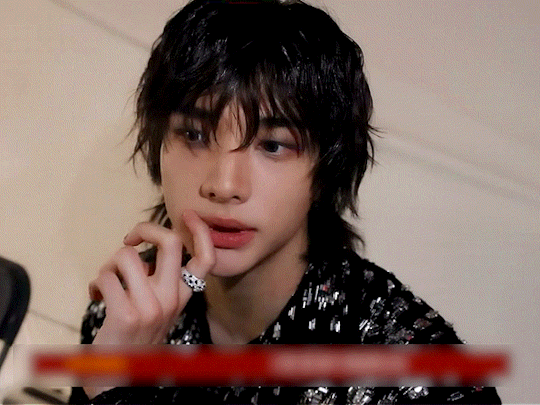





HYUNJIN CHK CHK BOOM BEHIND THE SCENES
#hyunjin#skz#stray kids#bystay#staydaily#gifs#the way his necklace looks like a cross with the versace print under it in the 3rd one#like yes sir i might be turning to god after watching u#5th gif he’s vibing as if they didn’t commit multiple criminal offenses in this mv.. including theft for stealing my heart.
604 notes
·
View notes
Text
"Care To Join Me?"
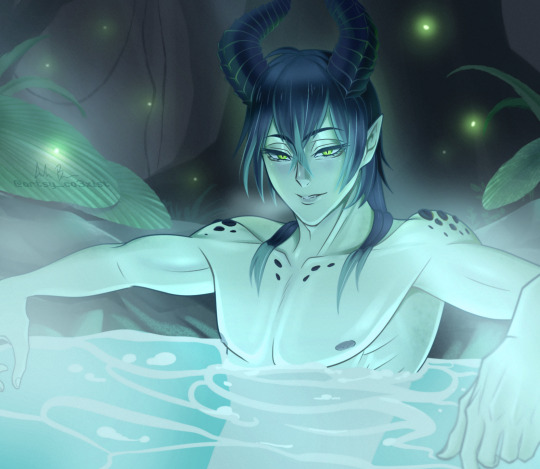
#ummm yes sir???#as long as sebek isnt around#twirling my hair#why are you staring at me like that your majesty? 👀#twisted wonderland#artists on tumblr#twst#disney twisted wonderland#twst fanart#disney twst#i have an art degree guys#malleus draconia#twst malleus#twisted wonderland malleus#malleus x yuu
2K notes
·
View notes
Text
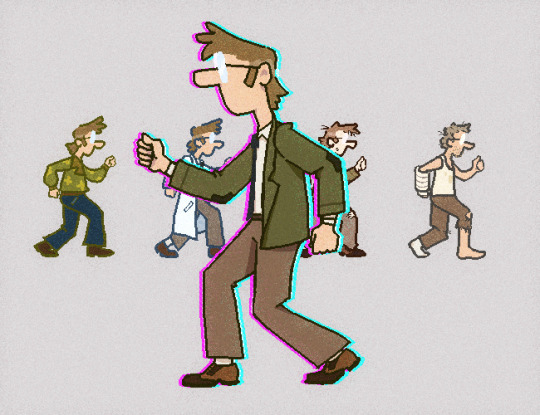
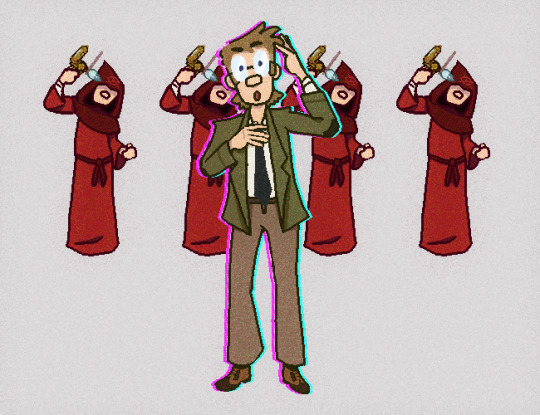
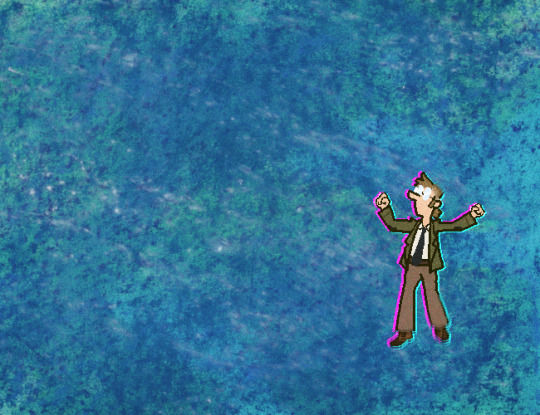
and you may say to yourself: "my god! what have i done?" and you may tell yourself: "this is not my beautiful wife!" and you may tell yourself: "this is not my beautiful house!" and you may ask yourself: "well, how did i get here?"
time isn't holding up, time isn't after us, time is a pony ride! (images described in alt text)
#gravity falls#fiddleford mcgucket#LETTING THE [FIDDLEFORD FRI]DAYS GO BY#“sir it's tuesday” i know. my computer has been busted for two weeks so i couldn't post them when i wanted to. just let me have this#again still new to alt text. i like being a little bit silly but let me know if it gets in the way of accessibility#artwork of the damned#uhhhh yeah this is actually something ive kind of wanted to draw for years now#favorite guy + favorite band = prime high-effort meme material#also. for the record. yes i have a mcgucket playlist. yes it has three talking heads songs on it. no none of them are “once in a lifetime”#also also i know that the lyrics in the description are in the wrong order. it's on purpose. i put them backwards for dramatic effect#also also also i'm pretty sure the “time is a pony ride” line is not actually sung on the album version of the track#but if you listen to/watch the live version from “stop making sense” you will hear it!#as well as hear a much more satisfying ending to the song imo. rather than it just fading out it has some really nice vocals#basically the moral of this story is you should watch “stop making sense”#if you made it to the end of the tags: congrats! you win a prize! the prize is permission to reblog this post
2K notes
·
View notes
Text
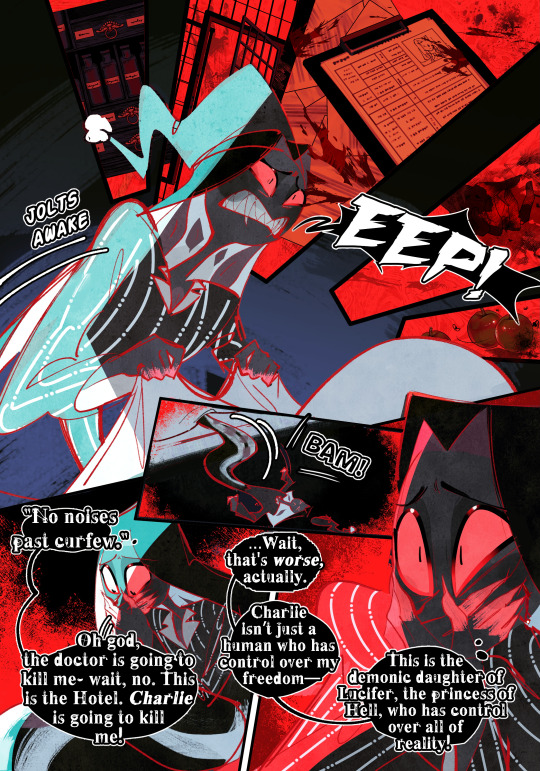
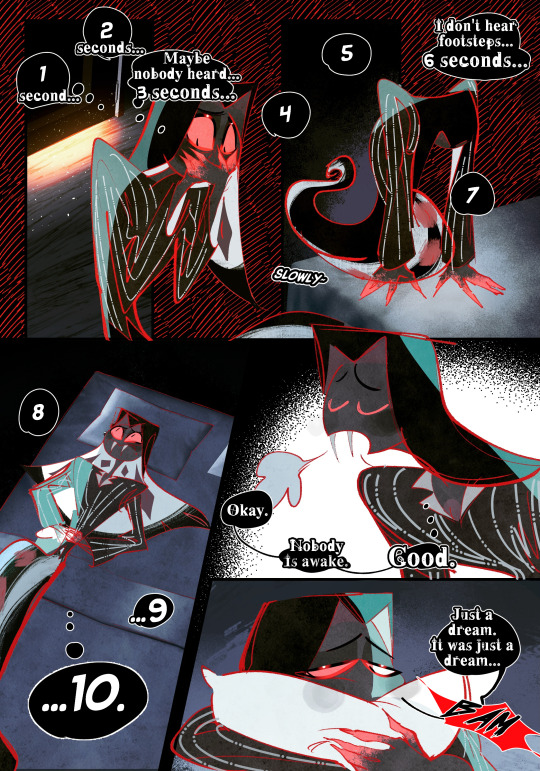
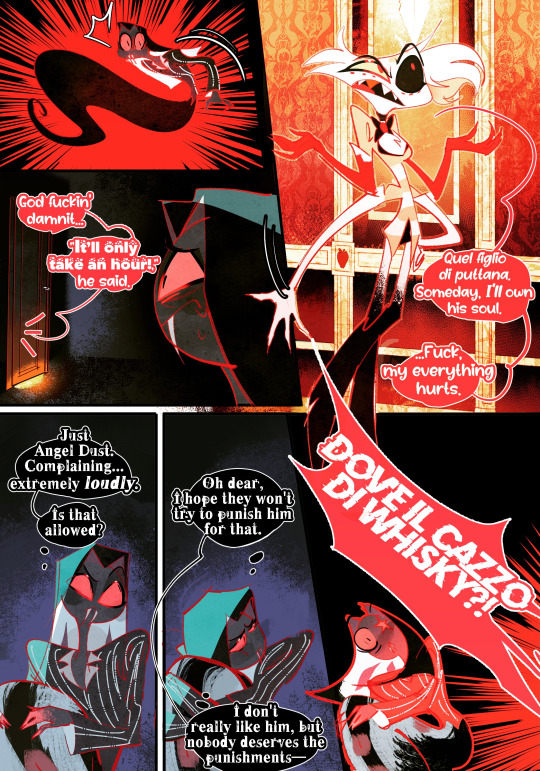
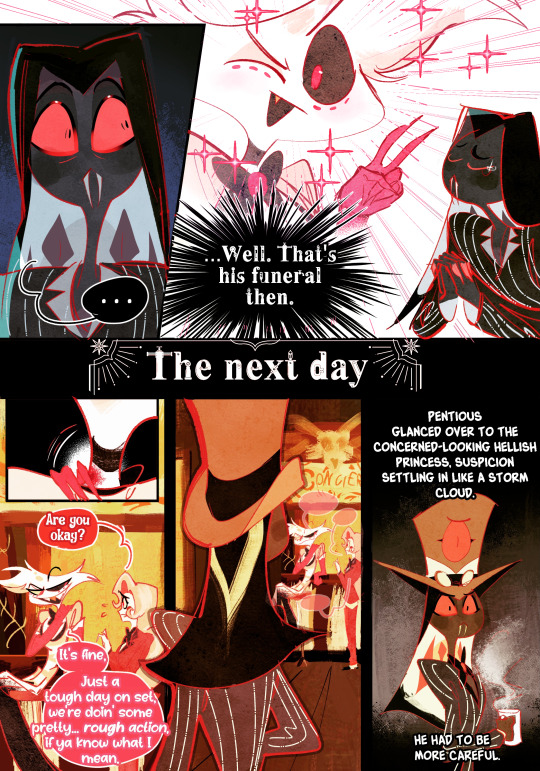
A lil comic based on the amazing fic "Up is Down, Sane is Insane"
#god i love this fic SO MUCH guys#that feeling where liking and leaving a 1k comment isn't enough to express how much you love and enjoy a story#that you just have to make a fanart for it to properly convey how grateful you are to be able to read such a cool story#well... a fancomic in this case i suppose#did i choose to draw that part of the story only because i thought the image of angel doing ✌️ as pentious prayed for him was funny? yes#yes i did#ooooh my wrist hurt tho#hazbin hotel#sir pentious#pentious#hazbin hotel sir pentious#hazbin hotel angel dust#angel dust#comic#myart#tw: blood
935 notes
·
View notes